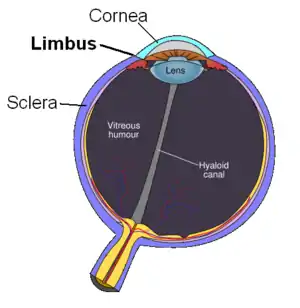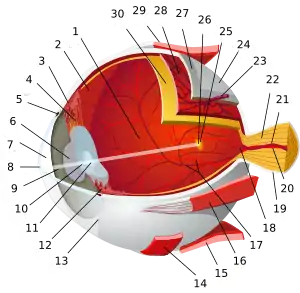Corneal limbus
The corneal limbus (Latin: corneal border) is the border between the cornea and the sclera (the white of the eye). It contains stem cells in its palisades of Vogt. It may be affected by cancer or by aniridia (a developmental problem), among other issues.
| Corneal limbus | |
|---|---|
 Schematic diagram of the human eye | |
| Details | |
| Identifiers | |
| Latin | Limbus corneae |
| MeSH | D016850 |
| TA98 | A15.2.02.014 |
| TA2 | 6748 |
| FMA | 58342 |
| Anatomical terminology | |
Structure
The corneal limbus is the border between the cornea and the sclera.[1] It is highly vascularised.[1] Its stratified squamous epithelium is continuous with the epithelium covering the cornea.[2]
The corneal limbus contains radially-oriented fibrovascular ridges known as the palisades of Vogt that contain stem cells.[1][3] The palisades of Vogt are more common in the superior and inferior quadrants around the eye.[4]
Clinical significance
Cancer
The corneal limbus is a common site for the occurrence of corneal epithelial neoplasm.
Aniridia
Aniridia, a developmental anomaly of the iris, disrupts the normal barrier of the cornea to the conjunctival epithelial cells at the limbus.
Glaucoma
The corneal limbus may be cut to allow for aqueous humour to drain from the anterior chamber of the eye into the subconjunctival space.[5] This can be used in glaucoma treatment.[5] The hole created only needs to be small, although slightly bigger than needed to account for gradual healing.[5] This procedure sometimes fails, particularly if the hole is large.[5] It can lead to eye irritation from blebbing.[5]
Trabeculectomy, a surgery used to treat glaucoma, is best performed with an incision through the superior part of the corneal limbus.[6] Mattress suturing may be used to close this incision.[6]
History
The word "limbus" comes from the Latin meaning "border".[7]
See also
References
- Dogru, Murat; Chen, Min; Shimmura, Shigeto; Tsubota, Kazuo (2009-01-01), Brightbill, Frederick S.; McDonnell, Peter J.; Farjo, Ayad A.; McGhee, Charles N. J. (eds.), "Chapter 4 - Corneal epithelium and stem cells", Corneal Surgery (Fourth Edition), Edinburgh: Mosby, pp. 25–31, ISBN 978-0-323-04835-4, retrieved 2021-09-27
- Pe'er, Jacob (2007-01-01), Singh, Arun D; Damato, Bertil E.; Pe'er, Jacob; Murphree, A. Linn (eds.), "CHAPTER 23 - Examination techniques, classification, and differential diagnosis of conjunctival and corneal tumors", Clinical Ophthalmic Oncology, Edinburgh: W.B. Saunders, pp. 125–128, ISBN 978-1-4160-3167-3, retrieved 2021-09-27
- Thomas PB, Liu YH, Zhuang FF, Selvam S, Song SW, Smith RE, Trousdale MD, Yiu SC (2007). "Identification of Notch-1 expression in the limbal basal epithelium". Mol. Vis. 13: 337–44. PMC 2633467. PMID 17392684.
- Goldberg MF, Bron AJ (1982). "Limbal palisades of Vogt". Transactions of the American Ophthalmological Society. 80: 155–71. PMC 1312261. PMID 7182957.
- Stamper, Robert L; Lieberman, Marc F; Drake, Michael V (2009-01-01), Stamper, Robert L; Lieberman, Marc F; Drake, Michael V (eds.), "CHAPTER 34 - Glaucoma outflow procedures", Becker-Shaffer's Diagnosis and Therapy of the Glaucomas (Eighth Edition), Edinburgh: Mosby, pp. 466–490, ISBN 978-0-323-02394-8, retrieved 2021-09-27
- Jackson, Timothy L., ed. (2008-01-01), "Chapter 7 - GLAUCOMA", Moorfields Manual of Ophthalmology, Edinburgh: Mosby, pp. 274–330, doi:10.1016/B978-1-4160-2572-6.50012-5, ISBN 978-1-4160-2572-6, retrieved 2021-09-27
- Iorio, Raffaele; O’Toole, Orna; Pittock, Sean J. (2015-01-01), Zigmond, Michael J.; Rowland, Lewis P.; Coyle, Joseph T. (eds.), "Chapter 29 - Autoimmune and Paraneoplastic Neurological Disorders", Neurobiology of Brain Disorders, San Diego: Academic Press, pp. 467–496, ISBN 978-0-12-398270-4, retrieved 2021-09-27
External links
- Atlas image: eye_1 at the University of Michigan Health System - "Sagittal Section Through the Eyeball"
- https://web.archive.org/web/20060510060508/http://www.vetmed.ucdavis.edu/courses/vet_eyes/images/s_4021_2.jpg
